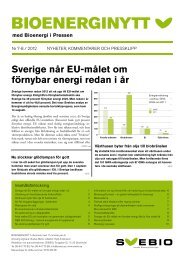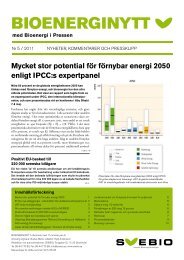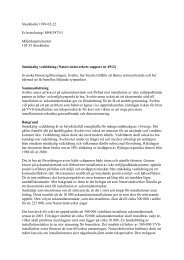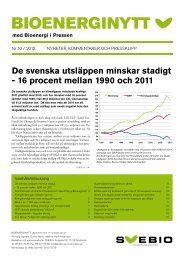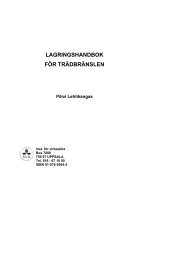Download it here (pdf) - Svebio
Download it here (pdf) - Svebio
Download it here (pdf) - Svebio
Create successful ePaper yourself
Turn your PDF publications into a flip-book with our unique Google optimized e-Paper software.
– Vafab Miljö aB, Västerås<br />
Vafab Miljö works w<strong>it</strong>h sustainable and environmentally<br />
sound handling of waste, and is owned by the regional municipal<strong>it</strong>ies.<br />
The population of the region is about 300,000,<br />
and t<strong>here</strong> are more than 10,000 businesses that generate<br />
waste.<br />
Växtkraft is a biogas plant in which bio-waste from households<br />
and restaurants is digested, together w<strong>it</strong>h ley crops<br />
from farms and sludge from grease separators in largescale<br />
k<strong>it</strong>chens. The biogas that is produced in the process<br />
can be utilised as environmentally compatible fuel for motor<br />
vehicles.<br />
Biofertiliser is also obtained as a residual product, something<br />
that farmers can spread back onto the fields as an<br />
ecological nutrient. The Växtkraft project creates a rotation<br />
of energy and plant nutrients.<br />
www.vafabmiljo.se<br />
iCE BrEaKEr rECEption<br />
FroM 17.00<br />
On arrival to Jönköping:<br />
Ice breaker reception w<strong>it</strong>h<br />
registration and a light<br />
meal. Included in the<br />
conference fees.<br />
prE. toUr 2, BIOfUElS fOR TRaNSPORT aND CHP<br />
Departure from Stockholm arlanda airport at 09.00<br />
Ethanol plant, handling of solid biomass at a large scale<br />
combined heat and power plant, small-scale biodiesel<br />
production and a biogas upgrading plant.<br />
Photo: Anders Haaker Biogas from household waste and ley crops<br />
Agroetanol’s plant in Norrköping uses energy from the nearby biomass CHP<br />
for <strong>it</strong>s processes.<br />
The ley crops are stored as silage in plastic for later use in the biogas plant.<br />
Green house using biomass for heating<br />
– tåkern Grönt, Väderstad<br />
Tåkern Grönt is a company that cultivates vegetables in<br />
greenhouses. The total greenhouse area is about 10,400<br />
m2 . T<strong>here</strong> are two boilers, one for straw and one new boiler<br />
for wood chips. The greenhouses, the family house, and<br />
other buildings are connected to the two boilers that feed<br />
an accumulator of 200 m3 .<br />
The biomass amount needed for this heating has replaced<br />
about 360 m3 mineral oil. Tåkern Grönt is the first company<br />
that KRAV* has approved for ecological cultivation in this<br />
field.<br />
*KRAV is a key player in the organic market in Sweden. KRAV develops<br />
organic standards and promotes the KRAV-label.<br />
www.takerngront.com<br />
Ethanol plant using grain as feed stock<br />
– Lantmännen, agroetanol, norrköping<br />
Sweden’s first large ethanol plant, run by Agroetanol, owners<br />
are Lantmännen, a large farmer’s crop marketing association,<br />
and LRF, the Federation of Swedish Farmers.<br />
The ethanol plant is in full operation on Händelö since 2001.<br />
Händelö is an island less than 10 km from the centre of<br />
Norrköping. The s<strong>it</strong>e is close to the oil depot and a biomass<br />
fired power plant. The steam and electrical power needed<br />
to operate the plant originate from renewable sources. The<br />
steam, which is primarily used for distillation and drying of<br />
feed, is produced in the bio-fuelled power plant close by.<br />
A new, three times as large a plant, was opened in 2008 at<br />
the same location. The new plant needs 400,000 tonnes<br />
of grain, from 70,000 hectares of land, and will produce<br />
150,000 m3 of ethanol. Biogas is also produced from distillers<br />
waste.<br />
www.agroetanol.se<br />
17




